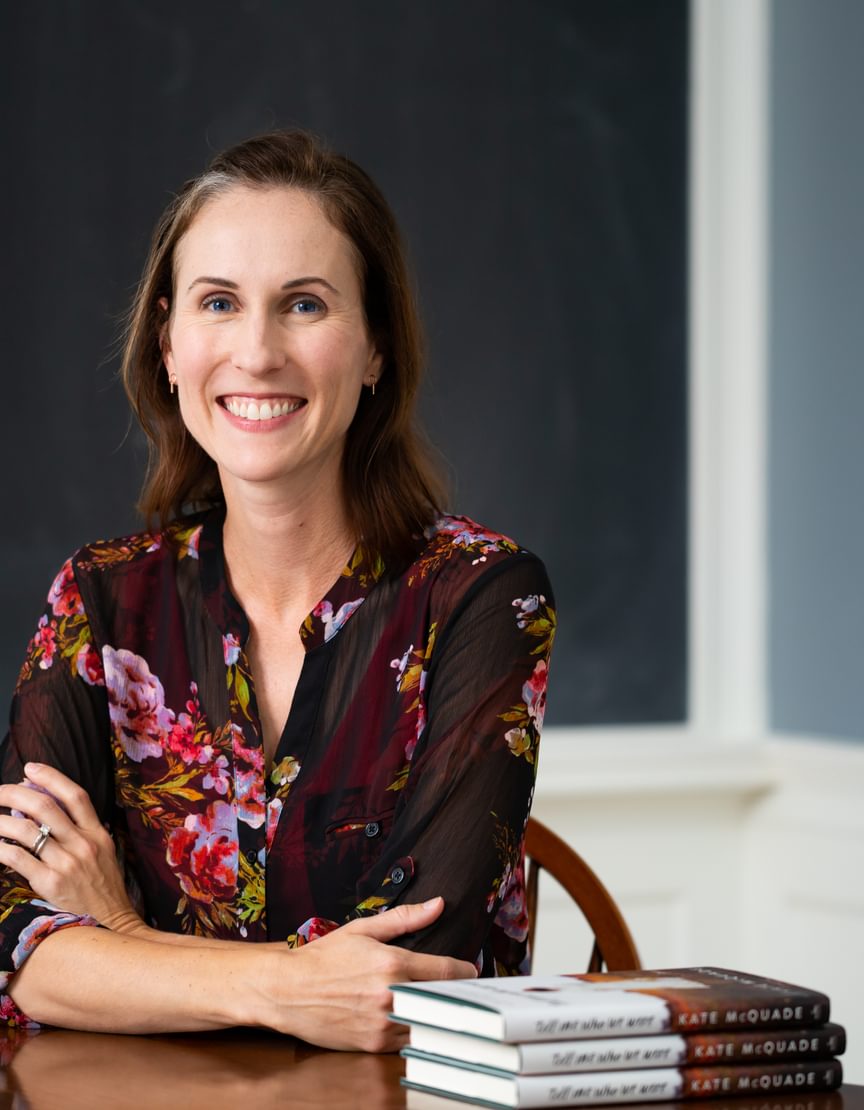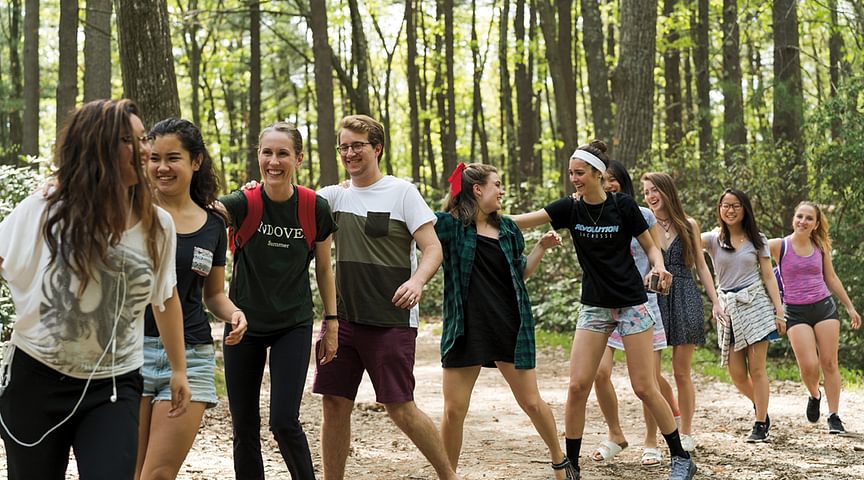
October 30, 2019
Author Kate McQuade enjoys the writing process
English instructor Kate McQuade explores themes of womanhood, mythology, and trauma in her classes and her writingby Allyson Irish
For Kate McQuade, it always starts with a question. The quirkier, the better. For example, a short story in her latest book began with McQuade pondering what might happen if a baby born to English-speaking parents started to speak French?
McQuade recently published a collection of short stories, Tell Me Who We Were. In this latest book, the English instructor explores themes of womanhood, mythology, and trauma through the lives of six girls who met in boarding school.
Below, McQuade talks about the classes she teaches, her writing process, and the unique challenges and support offered at a place like Andover.
How did you end up at Andover?
The way I arrived here is sort of unusual, in that I wasn't necessarily looking for a teaching job or a boarding school at all. I had gone through college believing that I wanted to work in publishing, and so I'd set up a career for myself in publishing and realized, just as I was about to graduate, that I did not want to be in publishing, that I wanted time to write.
I thought maybe teaching would be a better lifestyle for me to engage with literature because it was less about profits and losses and more about art, but I had no teaching credentials. And I discovered, sort of accidentally through research, that a number of boarding schools have teaching fellowships that are meant to be an introduction to teaching. I thought I would come for a year, try it, and see if I liked it. And I totally fell in love with it.
I lived in Bancroft for my teaching fellow year and I found I really enjoyed the dorm part of my job. I never would have anticipated that that would bring me a lot of energy. I'm dispositionally pretty introverted, but the dorm was such an important part of that year for me and my experiences since then. When an opening came up for a full-time position in 2006, I applied for it.
What’s the best compliment you’ve ever gotten about your writing?
Someone on Goodreads described my new book as “weird and lovely.” I thought that was the perfect description—exactly what I’d like my work to be.
Your latest book follows the lives of six girls who met in boarding school. How much of this was based on Andover or Abbot?
The school I’m writing about is certainly not Andover. But I was inspired by the physical landscape of Andover—Rabbit Pond makes an appearance—and also the idea of influential friendships formed at a young age. At the time [I was writing the book], I was living in Nathan Hale and working with 14-year-olds. I had a firsthand reminder of the intensity of my own friendships at that age—and a glimpse into the amplification of friendships at a boarding school.
How would you describe your writing process?
I love rewriting and revising early, messy drafts. That part has the most joy for me.
The hardest part is the drafting—the filling-up of blank pages—as well as finding the time to work on a book while also teaching and parenting. I’m generally a very slow writer, and I’m completely fine with that pace.
My process is very loose at first. I can’t know too much about where I’m going with a story or it’s dead on arrival. I need to wander in the dark for a while. I try to start with some kind of weird problem, something that keeps the surface-level plot moving forward while I figure out what the story is really about beneath the surface. And I figure that out by writing it, not before.
What’s an example of the academic freedom you have here at Andover?
A year ago, the athletic department let me develop a creative writing and hiking hybrid sport team. It was so wonderful, and I really hope to coach it again. Students signed up because they wanted more time to write and they wanted a community of writers in which to talk about their writing.
We would go hiking three times a week and then on our fourth day we'd have a workshop of whatever they wanted to discuss or work on. But it was all writing that they had done, on their own, for absolutely no stakes other than doing it for themselves and sharing it with each other. The closeness that I felt in that workshop between them, and the kinds of discussions I could have walking around the sanctuary talking about writing, were among the best conversations I've ever had about writing.

[footnote]
When asked what three Andover people would she invite to dinner, McQuade replied: “Julia Alvarez ’67 because I’ve learned so much about writing and teaching from her poetry. Frank Stella ’54 because I adore his minimalist paintings. And the ghost of Walker Evans ’22 because his documentary photography is incredible, and because I’d like to hear his take on Frank Stella.”
How did you develop the trauma literature class here?
At Andover, my initial impulse was that I just wanted to teach these books because they're amazing books. I had studied trauma literature in graduate school, and I was drawn to it initially through writers like Tim O'Brien and Toni Morrison, writers who are in some ways writing about writing or writing about memory. Those books really just spoke to me and the more I read books that were particularly concerned with memory, the more I kept revolving around the scholarship of raw trauma literature.
How have students responded to the class?
It has gone so well. And I think the reason it goes well—and in some ways, I think the reason that my students tend to be at least as good at analyzing this literature as adults I know, if not better—is because they are living in this world where truth is sort of under attack. Where you get your news today can determine the story that you’re hearing.
Storytelling now is more aware of itself as a story being told, not a firm truth. And all of these books that I teach are about that. They are about the ways that trauma is something that the mind doesn't register in the first place. And so, it poses this really interesting problem for writers, because how you tell a story that you don't fully know or understand is always at stake in these books.
How does the role of memory factor into trauma literature and into your writing?
Most of what we talk about in class is narrative structure, and how to tell a story that has, at its center, something missing. And that to me certainly bleeds into all of my work because everything that I write is about memory and the way memory's sort of moveable and unreliable.
Working with students, we discuss what it means when you don’t remember clearly what happened. And that's the part that fascinates me. Anytime you talk about memory it is elusive, but particularly when it's traumatic memory, which literally changes the way our brain works. So, trauma is the most unreliable thing to try to capture in a memory in the first place. But it's also, perhaps, the most important thing, the thing that we rely on most to reconstruct crimes or events that are really formative to who we are.
Is it difficult for you to assess students’ writing, particularly when they're writing about deeply personal issues?
It is really hard, and it's a challenge that I think anybody who teaches creative writing struggles with because there’s no one “right” way to write, no clear level of mastery. I think the way around that difficulty is to make sure that what I'm assessing is purpose-driven and established by the student, by the writer. I want to help them tell whatever story they're trying to tell more clearly and also help them find stories that they don't even recognize yet that they want to tell. So, in a lot of my classes, for instance, I'll have students draft a lot of essays, but I'll have them choose only a few for me to assess.
Being in such a rigorous academic setting, do you ever feel pressure in terms of developing new teaching methods or innovative curriculum?
I do think that everybody who ends up here has high standards for themselves, but that never feels to me like pressure. If anything, Andover relieves that pressure because you’re surrounded by such brilliant people doing really innovative things in their classroom and you can just absorb that and adapt it to what you're already doing.
At the end of the day, there's only so much time and everybody has a lot of balls in the air here, because you're not just doing one thing. I'm not just a writing teacher here. But there are ways that that cost has other benefits in terms of knowing a student outside of the classroom as well and being able to connect with them in ways you don't necessarily expect at first.
Categories: Academics
Other Stories

Andover’s 10th conference promotes open financial dialogue




